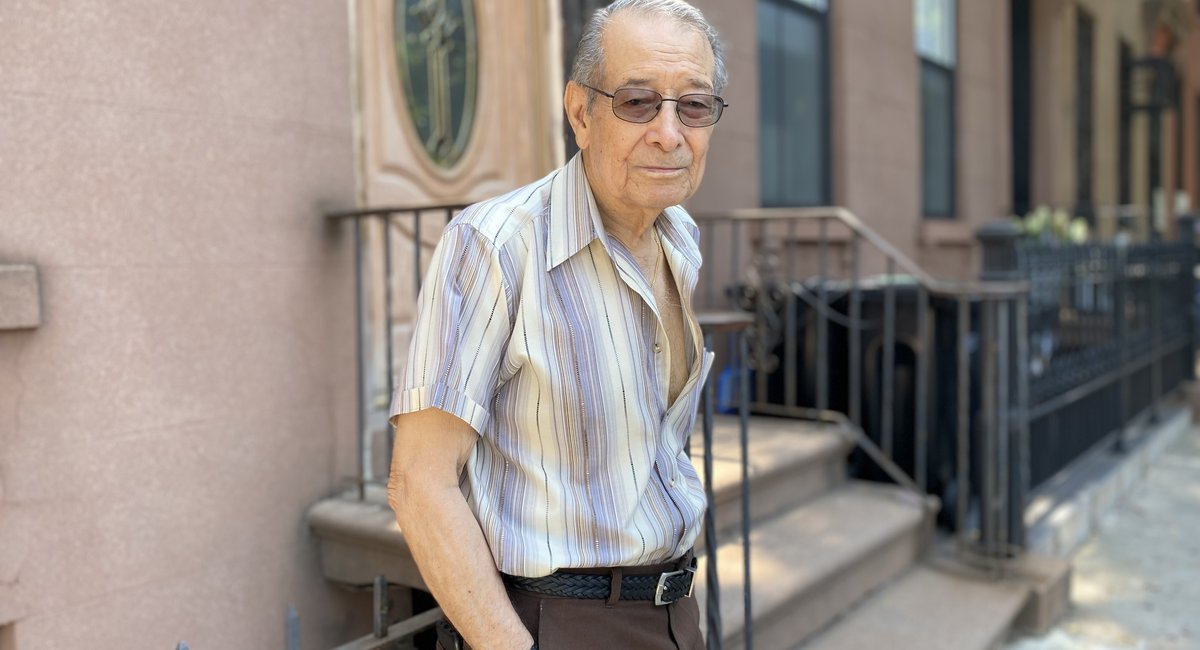A 90-year-old man fighting to hold onto the Brooklyn home he purchased more than 50 years ago could face eviction this week — unless an appeals court intervenes and allows him to prove he’s the rightful owner after he relinquished the property deed to alleged fraudsters more than a decade ago.
Ray Cortez lives on St. Mark’s Place, blocks from Barclays Center, in a three-story rowhouse he and his late wife purchased in 1969 for around $20,000. The value is now estimated at more than $3 million, according to real estate websites.
But Cortez, a retired contractor who immigrated to Brooklyn from Peru, said he’s not interested in cashing out and just wants to hang onto the home. A limited liability company, or LLC, that’s now listed as the owner in property records is seeking to remove him.
“I’ve been living here for more than 50 years,” Cortez said. “I want to recover my house.”
Cortez’s battle, detailed by Gothamist over the past two years, is part of a growing body of cases in New York where longtime property owners allege they unwittingly conveyed their ownership interests to unscrupulous parties, typically under false pretenses or by outright fraud.
Cases have been especially prevalent among longtime residents of color in gentrifying neighborhoods where prices have soared, according to advocates for deed theft victims. Often, the fraudulent transaction or deed theft isn’t discovered until years or decades after the fact.
“The property values start to go up and up and the fraudsters say, ‘Oh, if we can take advantage of people who don’t have good access to legal resources and other ways of learning how to defend their properties … they can come in,” said attorney Adam Grumbach, who represents Cortez. “It’s certainly happening all over Brooklyn, East Brooklyn, Queens, the Bronx.”
Elias Taied, an investor listed as a member of the LLC that bought the home, and the attorneys representing the company in the eviction case did not respond to phone calls and messages about the eviction and deed theft accusations.
Cortez’s eviction trial, scheduled for Thursday, was stayed, pending a decision by a state appellate court weighing whether to allow him to argue that he is the property’s rightful owner and was victimized in a complicated transaction nearly two decades ago.
Cortez’s future is in jeopardy as a result of what his attorneys say are fraudulent transactions and a court system that makes it hard for swindled owners to challenge alleged deed theft.
“He’s never had his day in court to litigate his case,” said attorney Bill Lienhard, who is also representing Cortez.
Cortez says he was duped into signing over the deed to the home in 2006. He has continued to live there and maintain it while fighting to show he is the rightful owner. Over the years, a mortgage was taken out on the property without his knowledge, with the borrower extracting nearly $700,000, according to court records. The LLC purchased the home at a 2018 foreclosure auction.
Two years ago, a state judge abruptly dismissed Cortez’s attempt to prove his ownership, ruling that the LLC purchased the home fairly and could proceed with the eviction. Cortez appealed the ruling and secured a hold on the eviction case as the appellate court does its review.
If the panel of appellate judges decides he has grounds to argue his case for ownership, his eviction proceeding will be suspended. If not, a housing court judge could order his removal as soon as Thursday.
Cortez’s lawyers also hope that state Attorney General Letitia James will take up the case, after making deed theft a focus since taking office in 2019. Cortez’s son, also named Ray Cortez, submitted a complaint to James’ office in June 2022 and said they are still waiting to hear whether officials will investigate.
A spokesperson for James said the office is reviewing the case.
A state law that took effect earlier this year allows the attorney general to intervene and halt eviction cases if a person shows evidence of potential deed theft.
Cortez and his attorneys say the problems began after he relied on an associate from a religious organization while seeking a loan for home renovations nearly two decades ago. They say he was convinced during the loan process to sign paperwork that transferred the property deed over to the associate.
They also say the associate, working with a since-disbarred lawyer, gave false assurances that the property deed would be transferred back to Cortez. Instead, Cortez said, he received paperwork indicating the return of the deed — but the actual deed was never filed with the city.
According to Cortez, he thought he remained the owner all along. Nine years later, though, he learned that Wells Fargo bank, the lender, had foreclosed on the property, leading to the home’s eventual sale to the LLC.
Cortez said he hopes to have the chance to hold onto the home he has lived in for decades.
“The idea that they can take everything away from me, it’s not easy,” Cortez said. “I trust that God will do justice.”
